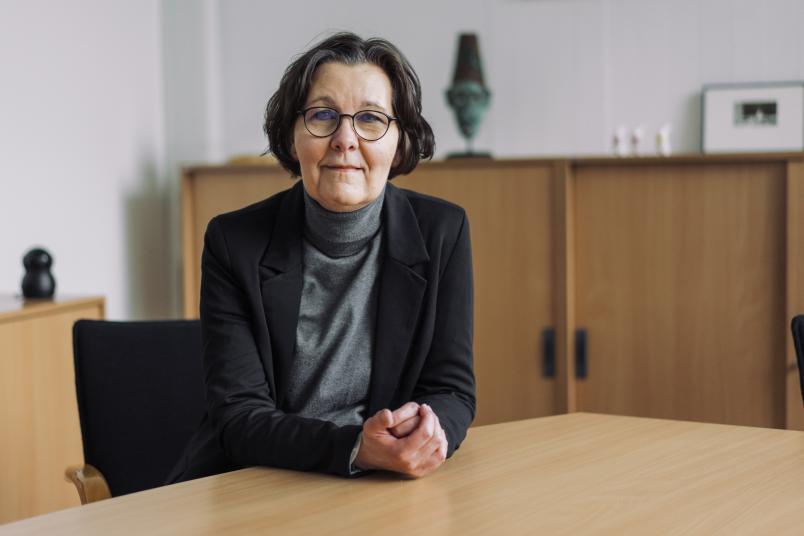
Interview
Anti-Semitism in Academia
Kristin Platt researches the history of anti-Semitism. And she’s also concerned about discrimination in contemporary academia. She’s addressed this issue in a number of projects.
Is National Socialism an outdated issue? Not at all, says associate professor Dr. Kristin Platt. As head of the Institute for Diaspora and Genocide Studies at Ruhr University Bochum, she’s concerned about anti-Semitism in the academic community.
Dr. Platt, one of your areas of research is anti-Semitism since the Second World War. Has it reached a new high since the resurgence of the Middle East conflict?
The figures we have on anti-Semitic statements and graffiti, up to and including physical attacks, clearly show that it has.
In the academic community, we are seeing that Jewish identity is being made recognizable as Jewish, much as it was in the 1950s when anti-Semitism was particularly virulent at universities. We may be running into the one-way street of viewing anti-Semitism as something that is a reaction to the Jewish present. But it has nothing to do with that. Rather, it’s a worldview that categorizes people and labels them as typically Jewish. That is actually anti-Semitism. Whereas an anti-Israel attitude and criticism of Israel are not.
Marginalizing Jewish researchers
The question of whether it is acceptable to criticize Israel has become a key issue in everyday research. Certainly since Documenta 2022, where anti-Semitic paintings were widely debated.
How does this affect the research community in Germany?
The question of whether criticism of Israel is acceptable has become a key issue in the field of culture and science. Not as strongly as at US universities. But it’s gone so far that, when inviting people to conferences, you consider where a person stands on the issue and then decide whether or not to invite them. Collaborations have broken down as a result, as have friendships.
Presumably this hinders academic discourse.
It does hinder it. Most importantly, however, researchers are held back by the fear of getting attacked on social media if they attempt, for example, to address the issue of whether or not genocide is taking place in Gaza.

We’re only discussing the question of whether we’re allowed to criticize Israel and what happens when we have criticized and been criticized for it. In other words, we’re talking about talking about.
We’re not even talking about the emergence of anti-Semitism, the opposition movement in Israel or how Hamas is portrayed in the media. We’re only discussing the question of whether we’re allowed to criticize Israel and what happens when we have criticized and been criticized for it. In other words, we’re talking about talking about. That’s the extent of the conversation. It’s a displaced academic debate.
How can we resolve the situation?
That’s difficult. After all, the question of whether it is acceptable to criticize Israel is not a question of research, but of social integration. The solution to the Middle East conflict is not the solution to this discussion.

Our job here at university is to not let this defeat us, but to show that these are issues that we can work on with our students as a community.
Freedom of expression and what it means is a question that’s very much on our minds in academia. For example, there are students who try to spread right-wing ideas in our seminars. As a lecturer, you have to think on your feet and react appropriately. That’s tricky. Our job here at university is to not let this defeat us, but to show that these are issues that we can work on with our students as a community.
How can educational institutions help to effectively combat anti-Semitism?
We’ve created new platforms for lecturers to exchange ideas and get help for such situations.
I believe that the issue of anti-Semitism needs to be anchored more firmly at an institutional level at German universities. In Bochum, this is the case with the Institute for Diaspora and Genocide Studies. But there is not a single chair in Germany dedicated to the study of National Socialism. For a long time, the prevailing opinion was that every stone had already been turned over three times on the subject, that the topic was obsolete. But it’s not.
You’ve also set up a dedicated certificate course in Bochum.
The certificate course “Collective Violence. Holocaust and Genocide Studies” was set up two years ago and can be studied across all faculties. We also offer courses on anti-Semitism. The first 22 graduates have already obtained the certificate.
What’s remarkable about North Rhine-Westphalia is that our students don’t have blank biographies, but rather family biographies that they reflect on in our seminars. Not only Jewish or Palestinian biographies, our students also have Kurdish, Kosovar-Albanian, Tamil and other heritages. The generation who is studying here has a completely new perspective on issues of violence, discrimination and exclusion. I find this very valuable, because this generation will be the first to do academic research on these topics. This is a tremendous opportunity.